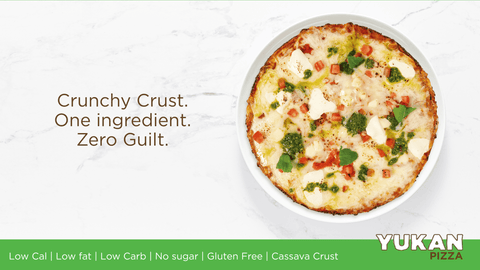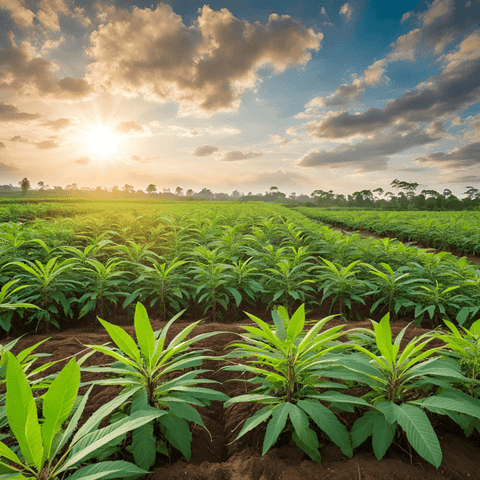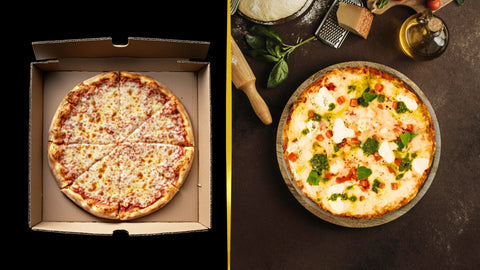Americans just need gluten-free pizza more than ever. Retail sales surged by 52% in 2019, and one-fourth of Americans actively look for pizza crusts made with wheat alternatives. My passion for inclusive dining options led me to find cassava flour. This remarkable root crop creates the most authentic pizza experience for people avoiding gluten. Farmers worldwide produce 160 million tons of cassava annually, which provides a naturally gluten-free, grain-free, and nut-free alternative that matches traditional wheat flour's texture perfectly.
Cassava flour's benefits go beyond being gluten-free. Your pizza crust becomes healthier with its higher fiber content and lower fat compared to wheat flour. The flour packs essential nutrients like vitamin C, manganese, and folate without compromising taste. People with celiac disease or those choosing a gluten-free lifestyle will soon find why cassava-based pizza crust becomes their go-to choice.
Why Regular Pizza Isn't for Everyone
Pizza creates real health challenges for millions worldwide. About 1% of the global population lives with celiac disease [1], and roughly 6% deal with non-celiac gluten sensitivity [2]. These numbers keep climbing, which makes it vital to know why regular pizza isn't right for everyone.
Understanding gluten sensitivity
People who have gluten sensitivity show different symptoms than those with celiac disease, but they still face substantial discomfort. Their bodies react to gluten without showing the autoimmune response or gut damage seen in celiac patients [2]. Here are common symptoms they might experience:
- Digestive issues like bloating and gas
- Brain fog and trouble focusing
- Unexplained fatigue
- Joint pain and headaches
- Skin rashes
- Anxiety and depression
Research points to an interesting fact - some people might not react to gluten itself. Instead, their bodies struggle with specific carbohydrates found in many foods. These carbs can ferment in the gut if they're not absorbed well, which leads to uncomfortable symptoms [2].
The celiac challenge
Celiac disease brings more serious concerns than sensitivity. This autoimmune disorder makes the body attack its own tissues when exposed to gluten [1]. The attack damages the small intestine's lining and hurts the villi - tiny finger-like projections that help absorb nutrients [2].
Celiac disease affects life beyond just physical discomfort. Studies reveal that up to 25% of people living with celiac disease for 2-5 years avoid eating out completely [1]. The damage can be long-lasting too. Half of all celiac patients still show signs of intestinal damage after two years, even with a strict gluten-free diet [1].
Cross-contamination remains a big worry. A study of certified gluten-free pizza restaurants showed that while most places follow safe practices, risks exist. Scientists tested 56 pizza samples and found one with detectable gluten, though it stayed below the 20 ppm safety mark [1].
Each person reacts differently to gluten. Research shows that eating more than 50 mg of gluten daily can harm people with celiac disease. Notwithstanding that, some people react badly to as little as 10 mg [3]. Regular wheat flour contains thousands of parts per million of gluten - just a tiny amount the size of a pen tip could trigger symptoms [3].
The food service industry's awareness has grown substantially. Back in 2003, less than one-fifth of chefs knew about celiac disease. By 2013, this number jumped to 78% [1]. This better understanding helps restaurants accommodate dietary needs, especially in places that specialize in gluten-free options.
What Makes Cassava Different
Cassava flour stands out among gluten-free alternatives because of its unique molecular structure and processing traits. My research and testing helped me find why this remarkable ingredient makes pizza crusts that taste just like traditional wheat-based versions.
Natural gluten-free properties
Cassava flour contains virtually no protein or fat [4]. This makes it naturally free from gluten proteins that cause adverse reactions in sensitive individuals. The flour has approximately 76.4% starch and 2% dietary fiber [4]. These components are the foundations of a pizza crust that holds together well without extra binding agents.
Unique starch structure
The molecular makeup of cassava flour creates pizza crusts with better texture and baking properties. Its starch granules can absorb water and expand while cooking. This leads to a chewy yet crispy crust texture [4]. The flour shows higher water absorption capacity at 1.23g/g [4] compared to other gluten-free options. This creates dough with perfect consistency.
Raw cassava's resistant starch content reaches about 75% [4]. This starch changes during baking and contributes to:
- Better digestibility
- Improved gut health through prebiotic effects
- Better blood sugar control
- Increased feeling of fullness after eating
Better than rice or corn alternatives
Cassava flour performs better than typical gluten-free options in many ways. Its neutral taste and fine, smooth texture create pizza crusts without the grittiness you find in rice-based options [5]. The final product gives an authentic pizza experience with great taste and texture.
The flour's starch structure works as a 1:1 substitute for wheat flour in many recipes [6]. This makes converting to gluten-free pizza much simpler. Rice or corn alternatives need complex flour blends to achieve similar results.
Cassava flour's superior binding properties [4] create pizza crusts that stay intact with toppings. Rice-based alternatives often make brittle or crumbly crusts. The natural composition creates crusts with crispy exteriors and chewy interiors [7]. These match the beloved texture of traditional wheat-based pizzas.
The flour shows excellent freeze-thaw stability with a water evolution rate of just 1.51% [4]. Pizza crusts maintain their quality even after freezing and reheating. This makes it perfect for meal prep and commercial food service.
The Perfect Pizza Texture
Bakers and chefs have struggled to create the perfect gluten-free pizza texture. Cassava flour has changed the game with its state-of-the-art properties that give amazing results in texture and strength.
Crispy outside, chewy inside
Cassava flour's unique molecular behavior during baking creates the ideal pizza crust. The flour creates a perfectly crispy exterior while keeping a delightfully chewy interior when baked at 500°F [8]. This happens because cassava flour's fiber and starch components work together to create a crust that feels light yet stays firm [8].
The perfect crust needs a two-stage baking process. The crust bakes for 6-8 minutes to build its basic structure [8]. Then it goes back in the oven with toppings for another 8-10 minutes and ends up with that beautiful golden-brown exterior [8]. This method will give a perfect texture throughout the crust.
How cassava holds toppings
Cassava-based pizza crust stands out because it knows how to support toppings without losing its shape. The flour's special starch structure builds a stable base that holds sauces, cheese, and other ingredients perfectly [9].
The crust stays stable because:
- The flour naturally binds ingredients without needing extra thickeners or gums [2]
- It keeps just the right amount of moisture so it won't get soggy [9]
- It creates a strong base that won't collapse under heavy toppings [9]
The dough's texture plays a vital part in getting great results. The cassava-based mixture looks different from regular pizza dough at first but becomes perfectly workable after resting for 5 minutes [2]. This rest time lets the flour's natural properties fully activate and creates dough that's both flexible and strong.
The crust keeps its shape even after freezing and reheating [9]. This makes it perfect for meal prep or restaurant use. The crust also handles different cooking methods well and can take heat up to 500°F, showing how reliable it is [8].
The best pizzas come from dough pressed between 1/8 and 1/4 inch thick [10]. This thickness helps heat spread evenly during baking and creates that perfect mix of crispy and chewy that everyone loves. The edges turn beautifully golden and the crust keeps its shape while it cooks [10].
Health Benefits Beyond Gluten-Free
Cassava flour does more than just being gluten-free. This flour brings amazing nutritional benefits that make it perfect for pizza crust. Research shows strong evidence about its benefits for digestion and overall nutrition.
Easy to digest
Cassava flour's high resistant starch content helps digestion in several ways. The starch ferments in the large intestine and works as a prebiotic to feed good gut bacteria [1]. These bacteria break down the resistant starch and create short-chain fatty acids that reduce digestive inflammation [1].
The flour's lack of inflammatory proteins makes it gentle on the stomach. The simple molecular structure lets your body digest it smoothly without the digestive issues you might get from wheat products [3].
Rich in nutrients
Cassava flour might look simple, but it packs quite a nutritional punch. A single cup contains:
- 42.4 mg of vitamin C (71% of daily value) [1]
- 0.8 mg manganese (40% of daily value) [1]
- 558 mg potassium (16% of daily value) [1]
- 55.6 mcg folate (14% of daily value) [1]
- 43.3 mg magnesium (11% of daily value) [1]
The flour's vitamin C content is higher than other staples like potatoes, yams, wheat brown rice, corn, and plantains [1]. This makes it stand out among gluten-free options for its nutritional value.
Lower in calories
People watching their calories will love cassava flour. A quarter-cup serving has about 114 calories [4], 2 grams of fiber, and less than 1 gram each of fat, protein, and sugar [4].
The flour helps control appetite through several ways. The resistant starch triggers your body to release hunger-reducing hormones called peptide YY and glucagon-like peptide 1 [4]. This helps you feel full longer throughout the day [3].
The flour's complex carbohydrate structure means your body digests it slower than simple carbs [3]. Your body uses this energy more effectively, which could help control blood sugar better [4].
Studies show that eating cassava flour might improve several health markers [4]. The resistant starch seems to help both blood sugar and cholesterol levels [4]. The high fiber content also helps healthy digestion and keeps your energy levels stable between meals [3].
Where to Find Gluten Free Pizza Near Me
Gluten-free pizza with cassava crust is now offered at Yukan Foods (https://yukanfoods.com), providing a range of delectable gluten-free pizza choices.
Conclusion
Cassava flour is changing how people enjoy pizza, especially those looking for gluten-free options. Pizza lovers with celiac disease, gluten sensitivity, or those choosing healthier lifestyles can now enjoy an authentic pizza experience that tastes just like the real thing.
This flour alternative stands out with its perfect mix of nutrition, texture and easy digestion. The crusts stay intact and deliver that perfect crispy-yet-chewy texture that makes it the best choice for a gluten-free pizza base.
Yukan Foods has become skilled at making delicious and safe cassava-based pizzas that everyone can enjoy. Their steadfast dedication to quality and innovation lets pizza lovers eat authentic pizzas, whatever their dietary needs.
You can find America's first cassava-based pizza, ready for home enjoyment, at https://yukanfoods.com. Of course, as more people learn about and try these pizzas, they will revolutionize gluten-free dining. Pizza nights can now bring everyone together again.
FAQs
Q1. What makes cassava flour an ideal choice for gluten-free pizza crust?
Cassava flour is naturally gluten-free and has a unique starch structure that creates a crispy exterior and chewy interior, closely mimicking traditional wheat-based crusts. It also has excellent binding properties, allowing it to hold toppings well without crumbling.
Q2. How does cassava flour pizza crust compare to other gluten-free alternatives?
Cassava flour outperforms rice and corn alternatives by providing a smoother texture, better binding properties, and a more authentic pizza experience. It can often be used as a 1:1 substitute for wheat flour, simplifying the conversion process for gluten-free recipes.
Q3. Are there any health benefits to using cassava flour for pizza crust?
Yes, cassava flour is rich in nutrients like vitamin C, manganese, and potassium. It's also lower in calories compared to wheat flour and contains resistant starch, which can aid digestion and promote feelings of fullness.
Q4. How does cassava flour pizza crust hold up with toppings?
Cassava flour creates a stable foundation that effectively supports sauces, cheese, and other ingredients without compromising structural integrity. The crust maintains its texture and doesn't become soggy, even under heavy toppings.
Q5. Where can I find pizza made with cassava flour crust?
Yukan Foods produce ready-to-eat cassava-based pizzas that can be enjoyed at home. Check it at https://yukanfoods.com
References
[1] - https://www.bobsredmill.com/articles/nutritional-benefits-of-cassava-flour
[2] - https://www.natashashome.com/cassava-pizza-dough/
[3] - https://www.netmeds.com/health-library/post/is-cassava-flour-healthy-benefits-uses-ways-to-add-to-your-diet-regimen-and-side-effects?srsltid=AfmBOorA4Zz0SOiStwjVXlXMh4l9b2EIQfTkGalJOw8ZAFgNzTXp4CC0
[4] - https://www.healthline.com/nutrition/cassava-flour
[5] - https://newsite.susanjoyfultable.com/blog/everything-you-need-to-know-about-cassava-flour/
[6] - https://predominantlypaleo.com/cassava-flour-pizza-dough-vegan-cheese/
[7] - https://sproutingzen.com/cassava-flour-gluten-free-pizza-crust-recipe-vegan-paleo/
[8] - https://thedomesticman.com/2015/08/11/ottos-cassava-flour-pizza-crust/
[9] - https://namelymarly.com/cassava-flour-pizza-crust/
[10] - https://www.ottosnaturals.com/blogs/recipes/gluten-free-pizza-recipe?srsltid=AfmBOop-mOWi3AFe4-bTi-AvyT_stSKyY8vUAuJk6ollIL94wM0VtRn9
[11] - https://cassavachicago.com/collections/pizzas?srsltid=AfmBOoqFYw8gPJsut3U1JMfMwLlUb3QUu0orXlGyyohZL6aT_KhZCMHQ
[12] - https://yukanfoods.com/products/four-cheese-pizza





